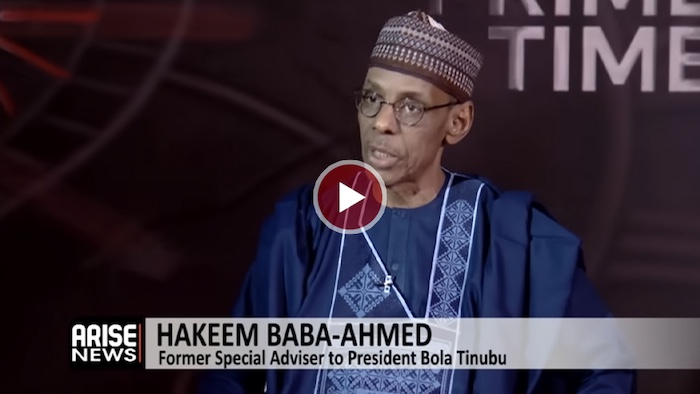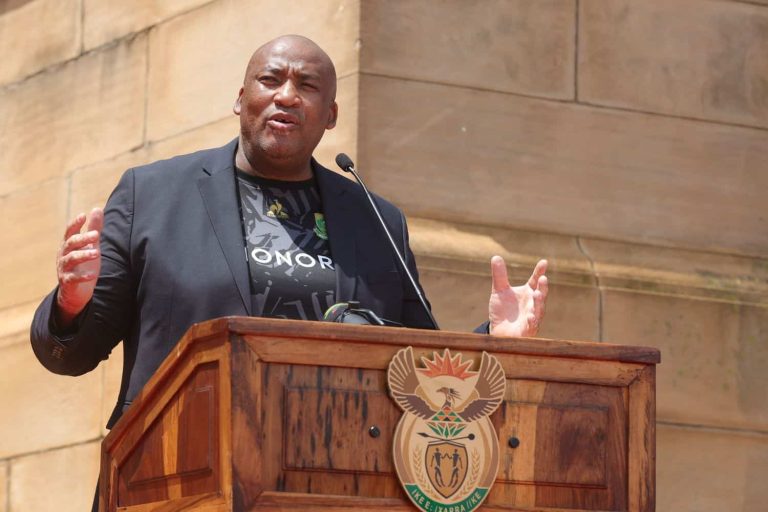

Former Special Adviser to President Bola Tinubu, Dr Hakeem Baba-Ahmed, has said Nigeria’s deteriorating insecurity and poor governance stem directly from years of failed leadership, warning that the country is “on its knees” and must not be pushed further into crisis by external pressure or internal neglect.
Speaking in an interview on ARISE News on Friday, Baba-Ahmed described as “shocking and disappointing” the recent threats reportedly made by former US President Donald Trump against Nigeria over alleged persecution of Christians. He said such rhetoric was dangerous and ill-advised, urging both nations to tread carefully.
“I’m shocked that even a president as unpredictable and unconventional as Trump would contemplate those utterances and threats against a country like Nigeria,” he said. “You would have thought that people would have told him to be careful — this is not the kind of position to adopt against Nigeria. The U.S. should have checked its intelligence and engaged before coming hard on a leadership that is already weak, in a country on its knees.”
He cautioned that any action by America that worsens Nigeria’s fragile state would have dire consequences beyond its borders.
“If America succeeds in creating a worse situation in Nigeria, everybody will pay the price for it. The worst thing we want is a falling out with America. We’ve been friends and allies for a long time, and this is the time when the US should stand by Nigeria,” he said.
Baba-Ahmed, who resigned from his role as Special Adviser on Political Affairs earlier this year, said Washington’s frustration with Nigeria’s insecurity was understandable but misplaced, arguing that the core problem was Nigeria’s “consistently bad leadership.”
“The US may feel it has run out of patience with Nigeria, but the truth is that our leadership has failed us,” he said. “This country, with all its potential, has been poorly served by bad, indifferent leaders for over 15 years. Everything that happens to this country can be traced to its leadership. President Tinubu has failed us. The president before him did virtually nothing about insecurity. The one before that didn’t either. Here we are again — friends who should be helping us are now saying, ‘fix yourselves or we’ll fix you.’”
He described the unfolding crisis as a possible “wake-up call” for Nigerians to hold their leaders accountable.
“It’s enough. Nigerians need to sit up and tell our leaders, ‘It’s enough.’ We cannot continue like this,” he said.
Baba-Ahmed faulted President Tinubu’s silence amid rising tension, saying it was “shocking” that the president had yet to directly address the nation.
“I’m shocked that President Tinubu has still not spoken to Nigerians. There’s a huge quarrel that has broken out; Muslims are saying they’re under attack, Christians are saying they’re welcome, and people are afraid. Things will get worse if America undertakes any activity that weakens this country further,” he said. “You would think the president would say, ‘Fellow Nigerians, I understand the situation. Here’s what we will do.’ That’s what leaders do. But our president has not spoken. It’s as if he disdains his people.”
The former presidential aide advised the US to be “measured” in its approach, warning against actions or rhetoric that might deepen religious divisions in Nigeria.
“If I were advising President Trump, I would have told him to choose his words carefully. His intelligence should be sound, and his engagement strategy well thought through. Instead, the persistent language of ‘freeing Christian brothers’ only plays into the hands of those who believe America doesn’t care about all Nigerians,” he said.
He welcomed the US Congress’ proposal for targeted sanctions against corrupt Nigerian politicians and security officials rather than blanket measures against the country.
“If the Americans or anybody else have evidence that Nigerians are directly or indirectly involved in worsening insecurity, get them,” he said. “If they’ve stolen our money and brought it to your country, stop it. Don’t give them visas. If they rig elections and run to your country for holidays, stop them. But don’t make ordinary Nigerians suffer. Any hostile act that makes us weaker jeopardises our recovery. It’s not good for Nigeria, not for America, not for the world.”
He warned that terror networks were attempting to turn the Sahel region into a global base of operations.
“There are attempts by interests to take over parts of Nigeria, Chad, Cameroon and Niger, and turn them into a global headquarters of terror,” he said. “We must never allow that to happen. We don’t want to live under Boko Haram, ISWAP, IPOB, or under the Americans. What we need is partnership, not punishment.”
On domestic issues, Baba-Ahmed said Nigeria’s insecurity crisis was worsened by exclusionary politics, corruption, and indifference to religious balance.
“Optics matter,” he said. “If you have a Muslim president and a Muslim vice president in a country of Muslims and Christians, it sends a message. Inclusion must be a key element of everything in Nigeria. Every life matters — Christian, Muslim, Northern or Southern. And Nigerians must get angry enough to tell these leaders: a leader who cannot secure his people has no business leading us.”
He also decried the wave of defections by opposition politicians to the ruling APC, describing it as evidence that Nigeria’s political system “is broken.”
“The transactional nature of Nigerian politics is poisonous,” he said. “Politicians are defecting to avoid prosecution or to chase power. It shows how little our democracy means to them. Between now and 2027, Nigerians must rise against this kind of leadership. If President Tinubu cannot fix insecurity within a year, Nigerians should turn their backs on him.”
Baba-Ahmed concluded with a direct challenge to Nigeria’s political class:
“No one should assume they can get our votes again unless they give us one promise — to secure this country. Every Nigerian life matters. We must fix corruption, restore hope, and build a country worth respecting. The failure of Nigeria would be unimaginable in its consequences.”
Boluwatife Enome



